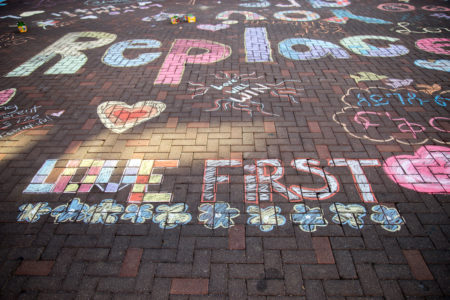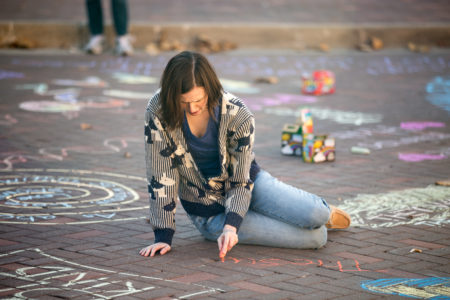
By Emma Friedlander
friedlan@grinnell.edu
Grinnell’s 8th Ave. was transformed into a canvas of love and support on Saturday when Intercultural Affairs hosted Replace Hate outside of the Joe Rosenfield Center (JRC). The event invited the Grinnell community to decorate the street with chalk art, which took the form of warm messages and phrases as well as vibrant drawings of hearts, flames, trees and other symbols.
Replace Hate was put on by Chief of Staff Angela Voos, Chief Diversity Officer Lakesia Johnson and Intercultural Affairs staff, along with the support of Mayor Gordon Canfield who granted permission to block off the road. The event was a response to a recent increase in bias incidents on campus, especially the stretch of 8th Ave. in front of the JRC. This increase corresponds to a national increase in bias-related incidents following last Tuesday’s general election.
“We had heard that there were trucks and cars going through campus shouting hateful, scary, sexist, racist comments. The frequency and severity was up, reflecting what was happening all over the country,” Voos said.
These cars and trucks have occasionally been witnessed on campus for years, but were reported at an unusually high frequency over the last month. According to Johnson, three or four complaints were reported in the last month.
“Obviously this is not the first time we’ve had experiences with people driving through our campus and saying horrible things, but quite a few have happened in front of the JRC,” Johnson said. “Symbolically it made sense to place messages in a place where bias-motivated incidents had recently occurred.”
The idea for a chalking event came from Jordan Brooks, Assistant Director of Intercultural Affairs, who has put on similar events in his previous student affairs positions.
“These emotions are really vibrant right now. When you initially put the chalk down it’s really bright and colorful, but it will fade,” Brooks said, explaining the significance of chalk art. “Right now we’re very sensitive to engaging with each other. But over time as we go back to our routine, [that] will fade, similar to how the chalk will fade.”
Once the chalk art has faded, Intercultural Affairs plans to hold another art event on campus, which will invite the public to participate in painting a mural. The painting event will be held on campus and the completed murals will then potentially be relocated to a space on the perimeter of campus or downtown. This move symbolizes the joining together of campus and community, a point that Intercultural Affairs hopes to emphasize in their public art events.
“A lot of community members came [to Replace Hate], and they were incredibly excited and willing to be a part of this conversation,” said Vrinda Varia, Student Support Advisor for Intercultural Affairs. “I’m excited almost, because I feel like there is an urgency to actually follow through on both ends and to engage in that conversation.”

The Intercultural Affairs department plans to keep the conversation going with a series of programs this semester. They continue to hold weekly community conversations in the Dining Hall and will screen the documentary “The 13th,” which explores the inordinate number of African-Americans in the American prison system, on Dec. 6 in observance of the 153rd anniversary of the 13th amendment. The Intercultural Affairs department urges students to follow them on Facebook, Twiter and Instagram to keep up with developing events.
Although the Replace Hate event made an important symbolic gesture, the same cars and trucks are likely to continue spreading hateful messages on campus from time to time.
“That street is public. We don’t own the street, we can’t control who drives down the street,” Johnson said. “Obviously there are complicated legal statutes that govern what is actionable from the Grinnell police department’s perspective. We can’t guarantee that we will never have other inappropriate visitors driving through the campus on a public street. But I do think the more information that we have, the more we can document, the better our chances are of exploring all of our options.”
In order to best combat bias-motivated incidents on and around campus, President Kington’s office urges people to document perpetrators of hate speech and acts and report them to Campus Safety if they feel comfortable doing so.

























































